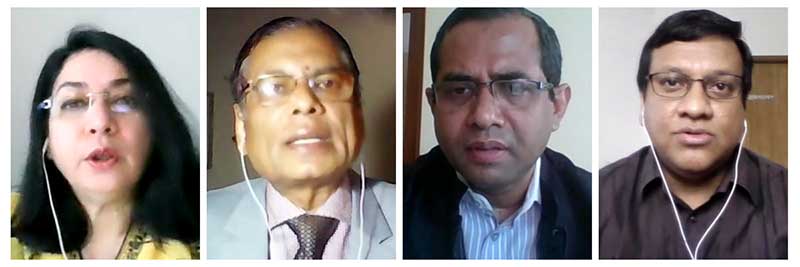The national budget for FY2021-22 is being prepared in the backdrop of a number of disquieting developments in the economy: weak performance of FY2020-21 budget implementation, the persistence of adverse impacts of the first wave of COVID-19, continuing stagnation in private investment, the second wave of the COVID-19 pandemic, and failure of the external sector to pick-up. FY2021-22 budget will need to address these as also the medium-term fiscal reform issues with a view to making a recovery sustainable.
In this backdrop, the Centre for Policy Dialogue (CPD) has proposed a number of fiscal budgetary measures and initiatives, keeping in the purview the upcoming FY2021-22 budget in its virtual media briefing on Recommendations for the National Budget FY2021-22, held on 29 April 2021. This media briefing was organised under CPD’s flagship programme Independent Review of Bangladesh’s Development (IRBD).

CPD’s report on budget recommendations stated that as the country is passing through the second wave of the pandemic, the policymakers, once again are posed with the challenge of maintaining a balance between the lives and livelihoods. During the first six months (July- December) of FY21, both revenue mobilisation and public expenditure have shown lower uptake compared to the same period of the previous fiscal year. Lower public expenditure, in the backdrop of the revenue mobilisation during this period, has led to a lower budget deficit as of December 2021 compared to that of December 2020. It is good that the agriculture sector has remained resilient during the pandemic. However, the external sector has shown a mixed performance in FY21.
CPD reiterated the need for an expansionary macroeconomic stance in the budget for FY22 which accommodates the needed additional public spending. The upcoming budget will also have to allocate resources in a way which would address needs of both the immediate and the recovery phase. In the immediate term, it will need to focus on health risk mitigation and ensuring food security through expanded safety nets. In the recovery phase which should be pursued parallelly, the budget will have to make allocations and undertake measures in view of the demands of entrepreneurs, enterprises, businesses and commerce. The urgency of improving the implementation capacity of the relevant ministries and departments related to the health sector cannot be over emphasised. Higher allocation for social protection in the FY22 budget is critically important. The budget for FY22 should allocate adequate resources for digital support and technologies for continuing education at educational institutions across the country.
Despite reeling from the shocks of the COVID-19 pandemic, total revenue collection posted a respectable growth of 8.6% during July-December of FY21. A staggering 74.2% growth is required for the remainder of FY21 in order to achieve the total revenue mobilisation target. In the FY21 budget, personal income tax rates were reduced. Providing benefits to monthly income earners of Tk. 4 lakh and above clearly went against the cause of promoting tax justice at a time when the resource was scarce. The budget for FY22 should correct this by reinstating the highest tax rate to 30%. In the FY21 budget, personal income tax rates were reduced. Providing benefits to monthly income earners of Tk. 4 lakh and above clearly went against the cause of promoting tax justice at a time when the resource was scarce. A medium-term plan should be formulated as regards phasing out the various tax exemptions provided during the pandemic.
As of December FY21, the overall budget deficit excluding grants stood at Tk. 8,408 crore, significantly lower than the deficit that prevailed in December FY20 (Tk. 35,751 crore). The budget deficit was financed mainly by domestic borrowing, although foreign borrowing also exhibited a considerable increase during July-December of FY21. Although Bangladesh has already received significant commitment as regards external funding support from different multilateral and bilateral sources, disbursement of the funds has been lagging behind. It is important for the government to pay special attention to ensure speedier disbursement of this pledged fund.
Public expenditure under the national budget for 2021-22 should highlight four areas; ensuring better health facilities for covid patients; enhancing social safety net programmes for poor, new poor and marginalised people; raising allocation for employment-enhancing infrastructure development projects; and supporting agriculture, SMEs and export-oriented industries for their recovery and thereby keeping the existing jobs.
Mr Towfiqul Islam Khan, Senior Research Fellow, CPD, made the keynote presentation at the media briefing on behalf of the IRBD research team. The event began with introductory remarks by Dr Fahmida Khatun, Executive Director, CPD. Professor Mustafizur Rahman, Distinguished Fellow and Dr Khondaker Golam Moazzem, Research Director, CPD were also present at the event and shared their views through responding to questions from the media.
[/su_spoiler]
